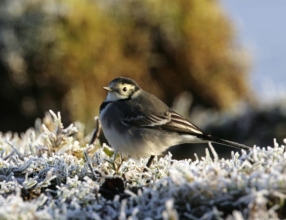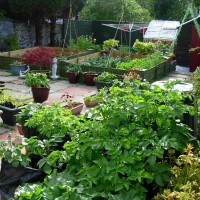By Suzanne Kelly.
Aberdeen City and Shire needs to help its over wintering birds, and there is something everyone can do to help. Whether you can spare a few scraps of food or put up bird feeders, any and all food and water is greatly needed.
Aberdeenshire is home to a wide variety of birds; it is a destination for bird lovers from around the world who can find Yellowhammer, Starling, Song Thrush, Skylark, Reed Bunting, Meadow Pipit, Woodcock, Barn Owl, Corn Bunting, Linnet, Dunnock and Buzzard – to name just a few. Most of these birds are considered high or medium conservation priority species according to the Royal Society for the Protection of Birds.
birds are virtually helpless in the face of these harsh conditions
Not only are these birds losing habitat at an alarming rate in our area due to changes in the countryside, but also the winters we’ve suffered through recently have been extremely damaging to our bird populations.
An RSPB spokesperson comments that the last three winters we have had are the hardest in the last three decades, and that the effect has been tremendously bad for species such as Kingfishers, Kites and common garden birds, such as goldcrests and long-tailed tits, which are struggling to survive as temperatures plummet and food cannot be found: it is clear that many populations will be further reduced.
The RSPB website recommends various ways to help wild birds survive, which include:-
“Leftovers like grated cheese, porridge oats, soft fruit, unsalted bacon, cooked rice, pasta and the insides of cooked potatoes are also a good source of energy for garden birds, and water for both drinking and bathing is vital”.
1. Put out feed regularly, especially in severe weather. Set up a bird table and use high calorie seed mixes. This can also be used to put out kitchen scraps such as grated cheese, pastry and porridge oats.
2. Put out hanging feeders for black sunflower seeds, sunflower hearts, sunflower-rich mixes or unsalted peanuts.
3. Ensure a supply of fresh water every day. If it is very cold use tepid water.
4. Put out fruit, such as apples and pears, for blackbirds, song thrushes and other members of the thrush family.
5. Food bars or fat hung up or rubbed into the bark of trees is a great help for treecreepers, goldcrests and many other species.
6. Put up nest boxes to provide roost sites for the smaller birds. They will then be used for breeding later in the year. When the weather conditions take a turn for the worse there is often a noticeable change in the behaviour of wildlife. Birds will try to replenish energy lost overnight first thing in the morning and last thing in the afternoon with a spurt of activity”.
Please visit the RSPB website at http://www.rspb.org.uk/ for further details on how to help birds now and year round.
You might be able to hurry into your heated house and get a hot snack when the snows fall, but these birds are virtually helpless in the face of these harsh conditions. Sparing a few minutes and a few scraps of food will definitely make a huge difference to them.

